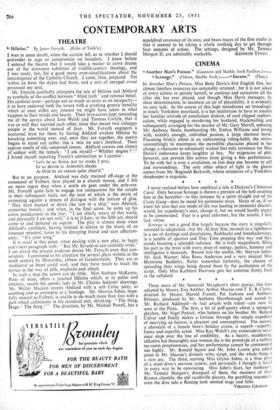CONTEMPORARY ARTS •
THEATRE
I WAS in some doubt, when the curtain fell, as to whether I should surrender to rage or compromise on boredom. I knew before I entered the theatre that it would take a master to carve drama out of the strenuous subtleties of twelfth-century theology, and I was ready, too, for a good many .over-simplifications about the intransigence of the Catholic Church. I came, then, prepared. Yet within an hour the dykes had burst, and a sort of enraged ennui possessed my soul.
Mr. Forsyth justifiably interprets the tale of Heloise and Abelard as symbolic of the conflict between " blind faith " and rational belief. His cardinal error—perhaps not so much an error as an incapacity— is to have endowed both the lovers with a crushing generic banality which at once stifles any interest we might have taken in what happens to their minds and hearts. Their love-scenes kept reminding me of the apergu about Jane Welsh and Thomas Carlyle, that it was as well they married each other, since that meant two unhappy people in the world instead of four. Mr. Forsyth engineers a nocturnal tryst for them by having Abilard awaken Heloise by knocking something over, and, once they are together, the poetry begins to stand out rather like a vein on one's forehead. Their rapture smells of old, unopened rooms. Abilard crowns one climax of ardour with the remark : " I ask myself—' Whither dogma ? '."
found myself repeating Tranio's admonition to Lucentio : " Let's be no Stoics, nor no stocks I pray, Or so devote to Aristotle's checks As Ovid be an outcast quite abjur'd."
But to no purpose. Abilard was duly maimed off-stage at the command of Fulbert, here played as a church mouse, and I felt no more regret than when a senile ox goes under the pole-axe. Mr. Forsyth quite fails to engage our compassion for the couple in their subsequent trials, not the least of which is the strain of swimming against a stream of dialogue with the texture of glue; " They have tracked us down like rats in a ship," says Abilard, somewhat loosely ; and when, in the final scene, he sums up his entire predicament in the line : " I am utterly weary of this world, and physically I am not well," it is as if Lear, in the fifth act, should come to and demand an aspirin. The play is almost done when Abelard's confidant, having listened in silence to the music of an itinerant minstrel, turns to his drooping friend and says affection- ately : " It's your song."
It is usual at this point, when dealing with a new play, to begin one's next paragraph with : " But Mr. So-and-so can certainly write." I am afraid the present evidence denies Mr. Forsyth even that con- solation. I commend to his attention the several plays written in'the tenth century by Hroswitha, abbess of Gandersheim. They are as mediaeval as heart could wish, and they have much to teach the novice in the way of pith, emphasis ,and attack. In such a trap the actors can do little. Miss Siobhan McKenna, flinty of mien, offers a pinched Heloise which, in its pallor and intensity, recalls the spooky lady in Mr. Charles Addams' drawings. Mr. Walter Macken invests Abelard with a soft Celtic piety, as soothing and as antiseptic as a bandage. Mr., Mervyn Johns, hope- fully miscast as Fulbert, is unable to do much more than fuss with a part which culminates in his maniacal exit, shrieking: 'The thing, 1-lugo ! The thing ! " The direction, by Mr. Michael Powell, has a
sepulchral reverence of its own; and bears traces of the film studio in that it seemed to be taking a whole working day to get through four minutes of action. The settings, designed by Mr. Terence Morgan II, are admirably workable. KENNETH TYNAN.


































 Previous page
Previous page